The conversation touches on sustainability, eco-villages, living lightly on the land and reducing ecological footprints. Michael Hale recounts his journey from environmental work in the 70s to co-founding an eco-village in the late 90s. He finds hope in collaborative local and bioregional efforts addressing climate change, advocating for collective action. Listen here
Uncategorized
Ecovillages Canada and its Global Relationships: A Personal Reflection
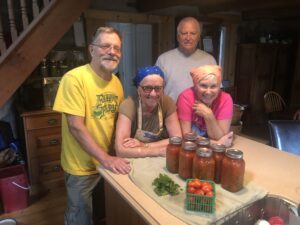 It’s Earth Day as I write this personal reflection on a part of my life that has been critical to helping Mother Earth through these very difficult times, caused by the human beings. I was always interested in travel in seeing other cultures and in the 1980’s I was able to make trips to different places. I visited China to see traditional Chinese medicine facilities and barefoot doctors. I was amazed at what traditional Chinese medicine offered and began my journey to become a Qigong teacher and therapist. I was also struck by the signs of the changes in China that were threatening the earth. The huge population growth, the use of resources and the beginning of conversion from bicycle travel to cars. I could sense the potential negative impact. At that time in the 1980’s, living in London, Ontario, the Forest City, Victoria Hospital where I was working got involved with the medical relief efforts after the devastating drought and famine in Ethiopia. We sent teams to assist with treating people. The biggest impact was trying to save the starving children starving. After the critical period, we took on assisting a community, Bette, to redevelop. We saw deforestation and human activity harming the earth. We formed Future Forest as partner of Bette. Using funds raised locally and from the Canadian International Development agency (CIDA), we worked with the community to develop more sustainable strategies. Using water more efficiently and building local sustainable businesses. I was able to see the impact in that culture and it led me to see what we were doing to our own environment in Canada.
It’s Earth Day as I write this personal reflection on a part of my life that has been critical to helping Mother Earth through these very difficult times, caused by the human beings. I was always interested in travel in seeing other cultures and in the 1980’s I was able to make trips to different places. I visited China to see traditional Chinese medicine facilities and barefoot doctors. I was amazed at what traditional Chinese medicine offered and began my journey to become a Qigong teacher and therapist. I was also struck by the signs of the changes in China that were threatening the earth. The huge population growth, the use of resources and the beginning of conversion from bicycle travel to cars. I could sense the potential negative impact. At that time in the 1980’s, living in London, Ontario, the Forest City, Victoria Hospital where I was working got involved with the medical relief efforts after the devastating drought and famine in Ethiopia. We sent teams to assist with treating people. The biggest impact was trying to save the starving children starving. After the critical period, we took on assisting a community, Bette, to redevelop. We saw deforestation and human activity harming the earth. We formed Future Forest as partner of Bette. Using funds raised locally and from the Canadian International Development agency (CIDA), we worked with the community to develop more sustainable strategies. Using water more efficiently and building local sustainable businesses. I was able to see the impact in that culture and it led me to see what we were doing to our own environment in Canada.
 By the early 1990’s I was looking for potential ways to deal with our own impact on Mother Earth. My wife, June, and I got involved with the Global Action Plan for the Earth (GAP). This project developed by Robert Gilman and David Gershon was to get households together as teams to reduce their global impact. The focus was 6 areas including waste, water, transportation, energy use, consumerism and empowerment. The program had a method to measure the results. I was in Uxbridge, Ontario by this time, and we were able to get 90 households to make a difference. The local newspaper the Cosmos followed the progress and activities of our GAP program participants. Even more impactful, for me, was the connection to the international aspect of GAP as multiple countries took part. We had international Board meetings including one at our family community in Uxbridge Ontario to compare results and share approaches. In 1995, I went to Egypt as a consultant to work on a CIDA project and again had the impact of another culture on me. Its challenges reinforced the need for action in my own home area and in the whole world.
By the early 1990’s I was looking for potential ways to deal with our own impact on Mother Earth. My wife, June, and I got involved with the Global Action Plan for the Earth (GAP). This project developed by Robert Gilman and David Gershon was to get households together as teams to reduce their global impact. The focus was 6 areas including waste, water, transportation, energy use, consumerism and empowerment. The program had a method to measure the results. I was in Uxbridge, Ontario by this time, and we were able to get 90 households to make a difference. The local newspaper the Cosmos followed the progress and activities of our GAP program participants. Even more impactful, for me, was the connection to the international aspect of GAP as multiple countries took part. We had international Board meetings including one at our family community in Uxbridge Ontario to compare results and share approaches. In 1995, I went to Egypt as a consultant to work on a CIDA project and again had the impact of another culture on me. Its challenges reinforced the need for action in my own home area and in the whole world.
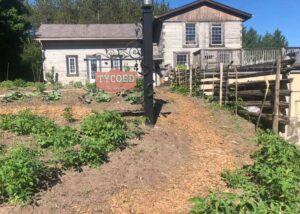 When I returned from Egypt, I was contacted by Milt and Barb Wallace of Sun Run Farm, an organic, regenerative farm in Ontario. They had just returned from a meeting in Findhorn Scotland of people from around the world. They had initiated the Global Ecovillage Network (GEN). GEN is an ever-growing network of regenerative communities and initiatives that bridge cultures, countries and continents. It is composed of 5 regional networks and a youth arm that spans the globe and now has over 10,000 communities identified. An Ecovillage is an intentional, traditional or urban community that is consciously designing its pathway through locally owned, participatory processes and addresses sustainability through the regenerative areas of social, cultural, ecological and economic activities.
When I returned from Egypt, I was contacted by Milt and Barb Wallace of Sun Run Farm, an organic, regenerative farm in Ontario. They had just returned from a meeting in Findhorn Scotland of people from around the world. They had initiated the Global Ecovillage Network (GEN). GEN is an ever-growing network of regenerative communities and initiatives that bridge cultures, countries and continents. It is composed of 5 regional networks and a youth arm that spans the globe and now has over 10,000 communities identified. An Ecovillage is an intentional, traditional or urban community that is consciously designing its pathway through locally owned, participatory processes and addresses sustainability through the regenerative areas of social, cultural, ecological and economic activities.
The More Beautiful World Our Hearts Know is Possible
Recently, I was talking to a twenty-something friend about the state of the world: climate change… stuff like that. I could see that, like many of her generation, it made her sad to contemplate it all. On a sudden inspiration, I showed her the title of a book: The More Beautiful World Our Hearts Know is Possible, by Charles Eisenstein. As she read those words, a big smile came over her face. We connected on that idea.
Eisenstein says: “… at the bottom of our Story of the World is the Story of Self, with its delusions of separation from other people, from nature, from Gaia, from anything we might call God.” This same conditioning sets us up to want to change others who don’t see things the same way–to criticize and judge others. Yet we know intuitively, or from bitter experience, that that won’t work. So what do we do? Eisenstein suggests that we begin to re-imagine life based on a new story–one of interbeing.
I need to remind myself about this–quite frequently it seems…
An Encounter with Barbarians
During a walk I encounter barbarians…
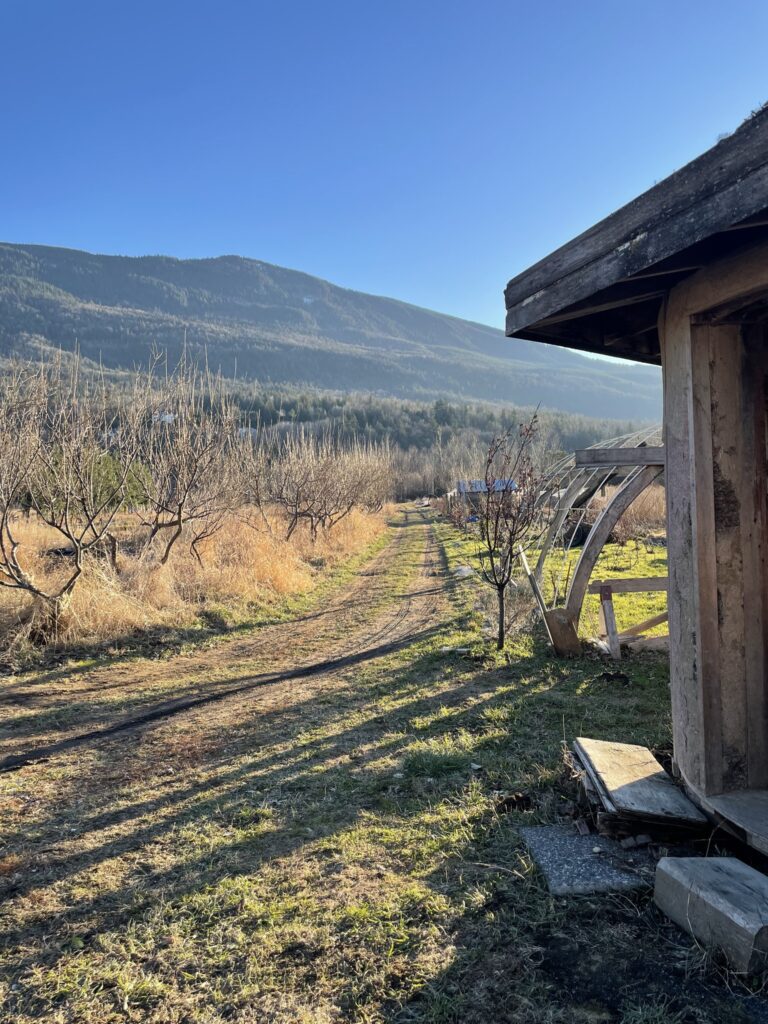
That may sound dramatic, but it is true. I’ll tell you the story: On a beautiful sunny day just before solstice (and before the big snowfall), I took a walk on our farm at the Yarrow Ecovillage in unceded Stó:lo territory.
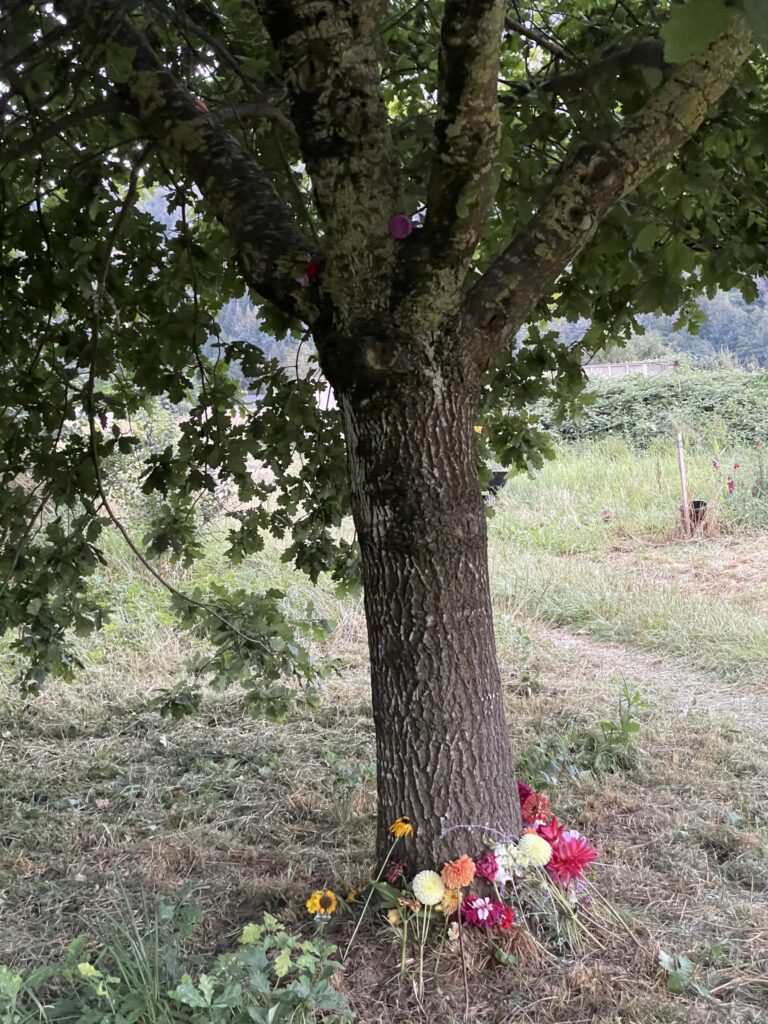
I walked along the farm lane, past the Oak tree that my son planted 17 years ago on the edge of the plot of land that our family farmed.
I crossed the creek and took a path through the Permaculture Food Forest, part of a stream restoration project that turned a ditch into a vibrant, biodiverse ecosystem.
When I had gotten about 3/4 of the way on the path around the farm, along the eastern edge of our property, I came to the Kinder Morgan/Trans Mountain Pipeline project that has now advanced as far as our fence. The barbarians are at our gate.
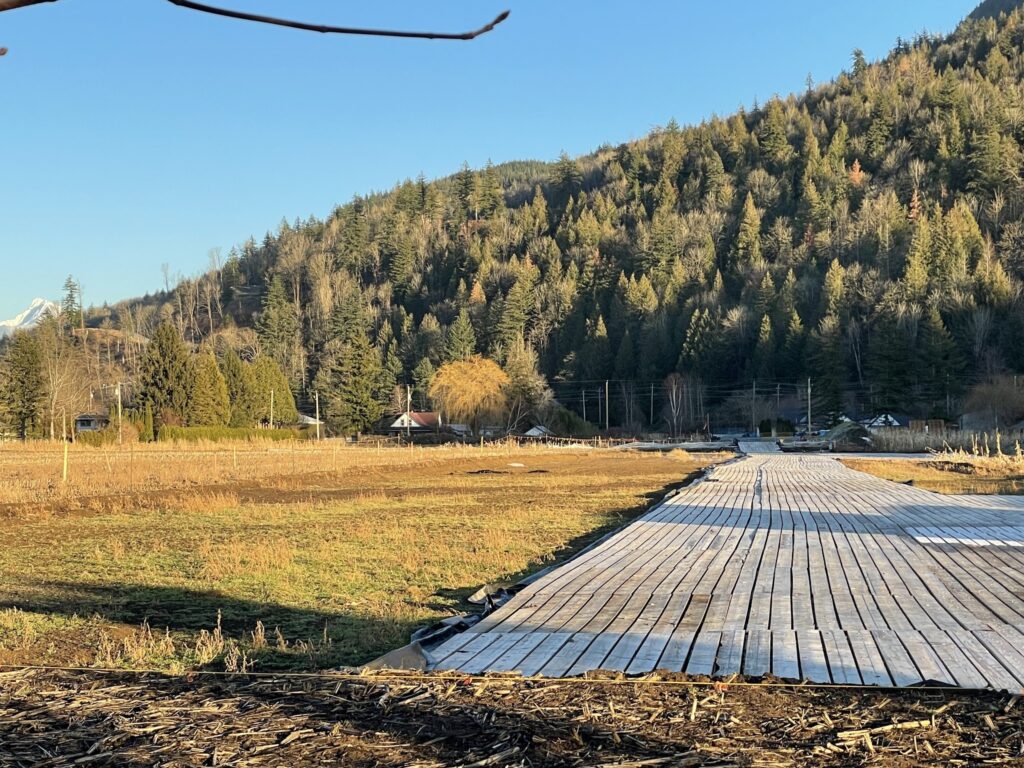
Fossil capitalism’s days may be numbered, but the struggle is far from over folks. As I looked at that horrendous right of way for the new pipeline, I felt sick.
Taking A few deep breaths, and, turning away, my eyes took in the ponds of our constructed wetlands, and nearby, our outdoor school for children. I calmed down. I reflected on what Charles Eisenberg refers to as the “new story.”

I’m coming to the belief that we need to keep adding to the new story, until the old story of fossil capitalism no longer controls us, and the Planet can breathe again.

